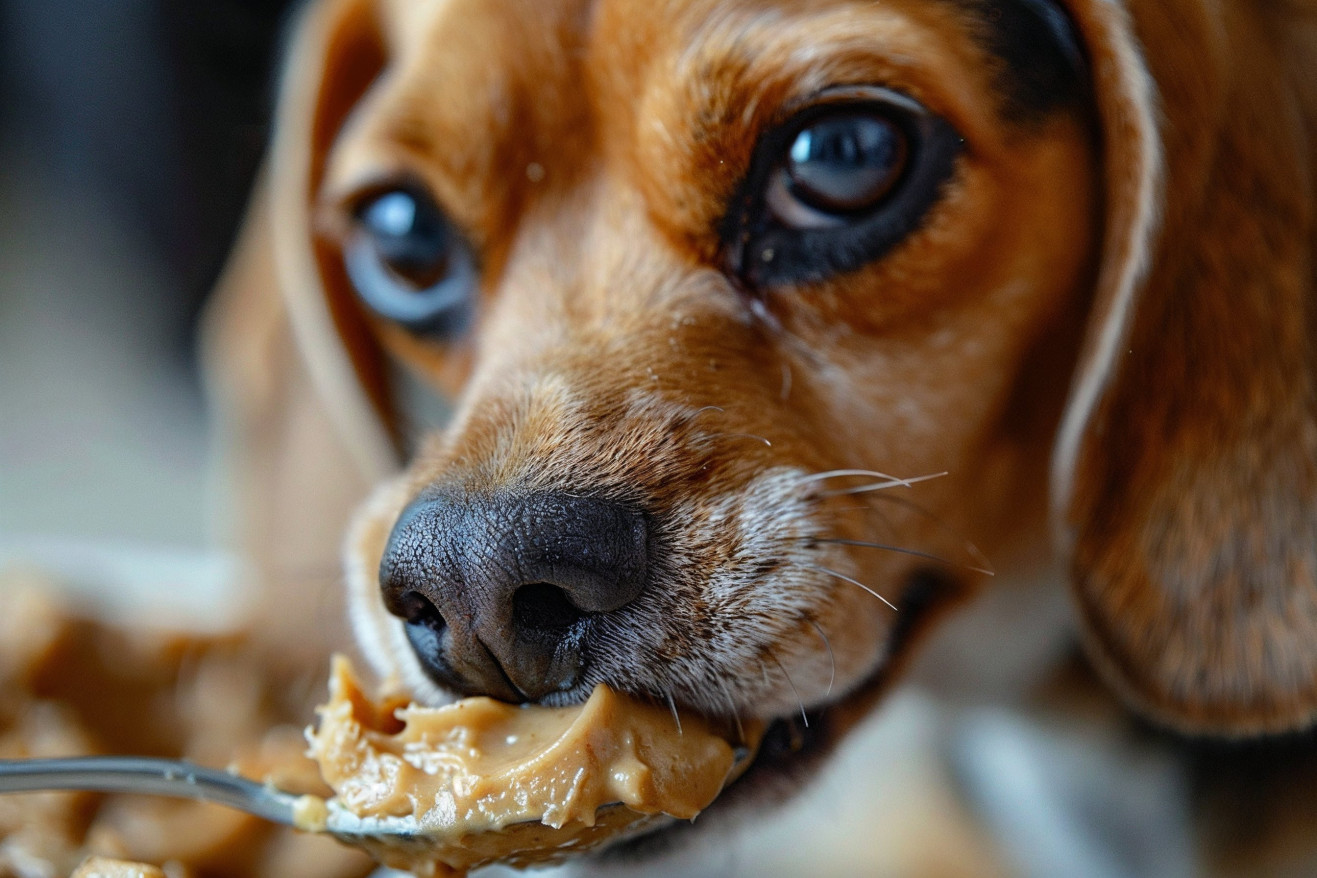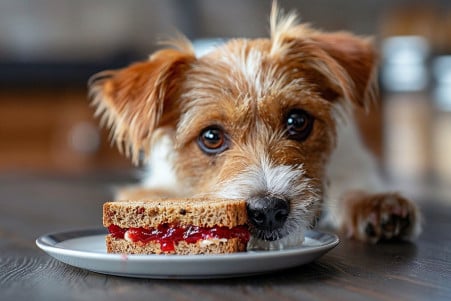Why Dogs Like Peanut Butter So Much? Exploring Canine Preferences
6 April 2024 • Updated 5 April 2024

If you have a dog, you've probably noticed how much they love peanut butter. Not only is it a tasty treat for your furry friend, but it can also be a great way to distract them or get them to take their medicine. But what is it about peanut butter that makes it so appealing to dogs?
Peanut butter's high protein content and nutty smell make it an attractive option for dogs. Its sticky consistency also makes it fun for dogs to eat, as they can lick it off of things. Finally, the healthy fats in peanut butter are appealing to dogs because they are calorie-dense, which is something that dogs' ancestors would have sought out in the wild.
In this article, we'll explore the science behind why dogs love peanut butter, drawing on studies from animal nutritionists, veterinarians, and evolutionary biologists. These studies have looked at everything from dogs' taste preferences to their reactions to different foods to the nutritional makeup of peanut butter and how it meets dogs' dietary needs. This information can help dog owners better understand when and how to use peanut butter as a treat or training aid.
Why do dogs like peanut butter?
Nutritional Value of Peanut Butter for Dogs
Peanut butter is full of nutrients that make it a great treat for dogs. It is a great source of protein, with more than 7 grams in a 2-tablespoon serving. Protein is important for muscle growth, immune support, and overall well-being in dogs.
Peanut butter is also full of healthy unsaturated fats like linoleic acid, which is good for skin and coat health and provides energy. It's a great source of fiber, which can help with digestion and a healthy gut, too. (via Wag!)
This nut-based snack also contains important vitamins like vitamin E, which is important for muscles, eyes, and skin, as well as B vitamins like niacin, which is good for the coat, brain, and metabolism. Essential minerals like magnesium, manganese, and phosphorus are also in peanut butter to help with energy production, protein metabolism, and bone health.
That said, peanut butter is also high in fat and calories, so it should be fed in moderation as part of a healthy diet to prevent obesity and other weight-related problems. While it is nutritious, peanut butter also comes with some potential downsides that responsible pet parents should be aware of.
Risks and Dangers of Peanut Butter for Dogs
While peanut butter can be a safe and healthy snack for dogs, there are some risks and dangers to consider. For example, some peanut butter brands contain xylitol, a sugar substitute that is toxic to dogs and can lead to liver failure and hypoglycemia.
Peanut butter is also high in fat and calories, which can lead to obesity and other health problems if it's consumed in large amounts. Dogs with peanut allergies can have reactions that range from skin problems to gastrointestinal issues to anaphylaxis.
Finally, chunky peanut butter and peanut butter with other ingredients like chocolate can be choking hazards or contain other harmful substances. To avoid these risks, it's important to feed dogs peanut butter in moderation.
The Best Peanut Butter for Dogs
When shopping for peanut butter for dogs, it's best to stick with natural, unsalted options that don't include added sugars or artificial sweeteners like xylitol. According to Can Dogs Eat Peanut Butter? All You Need to Know in 2023 – Woof, xylitol is extremely toxic to dogs and can lead to dangerous drops in blood sugar and severe liver damage.
In addition, many of the peanut butters that are made for human consumption include additives that can lead to inflammation and weight gain in dogs. PetMD suggests that you look for peanut butter that has the fewest additives and preservatives. This includes homemade peanut butter and natural brands like Crazy Richard's and CB's Nuts, which allow you to have more control over the ingredients.
Preventive Vet also recommends that you choose organic peanut butter, which is free from pesticides and other potentially harmful chemicals. Dog-specific peanut butter brands are another good option since they are formulated with a dog's nutritional needs in mind.
In general, it's important to read the label of any peanut butter you are considering giving to your dog and make sure it doesn't include added sugars, salts, or artificial sweeteners. If you choose the right product, you can give your dog peanut butter as a treat or use it as a training aid without any worries.
Using Peanut Butter for Training and Enrichment
When used in moderation, peanut butter can be a helpful tool for training and enrichment. As stated by Can Dogs Eat Peanut Butter? Yes, Sometimes – The Honest Kitchen, peanut butter is a great high-value reward for positive reinforcement training. Dogs love the taste and texture of peanut butter, and it can be spread on surfaces to keep them focused on the task at hand.
In addition to training, peanut butter can be used for mental enrichment when it’s stuffed into interactive toys, such as Kongs. According to Can Dogs Eat Peanut Butter? 3 Important Things to Look Out For, when peanut butter is frozen in a Kong, it can be a fun way for dogs to stay entertained for longer. It can also be used to hide pills or supplements, which can help dogs take their medicine more easily.
Although peanut butter can be a fun ingredient to use in homemade dog treats, The Honest Kitchen warns that it should only be a small part of a dog’s daily caloric intake to prevent weight gain and other health problems. Like all treats, it’s important to use peanut butter in moderation and pay attention to portion sizes when adding it to your dog’s diet.
The Verdict: Peanut Butter and Dogs – A Delicious but Cautious Combination
Peanut butter can be a safe and nutritious treat for dogs, but it should be given in moderation and with some caveats. The high protein, healthy fats, and smell of peanut butter make it a popular treat option for many dogs. However, pet parents need to be careful to read labels and avoid peanut butter that contains potentially toxic ingredients like xylitol.
It’s also important to make sure dogs don’t eat too much peanut butter, which can lead to obesity, pancreatitis, and other health issues. If used carefully, peanut butter can be a healthy and tasty part of a dog’s diet and training regimen.


